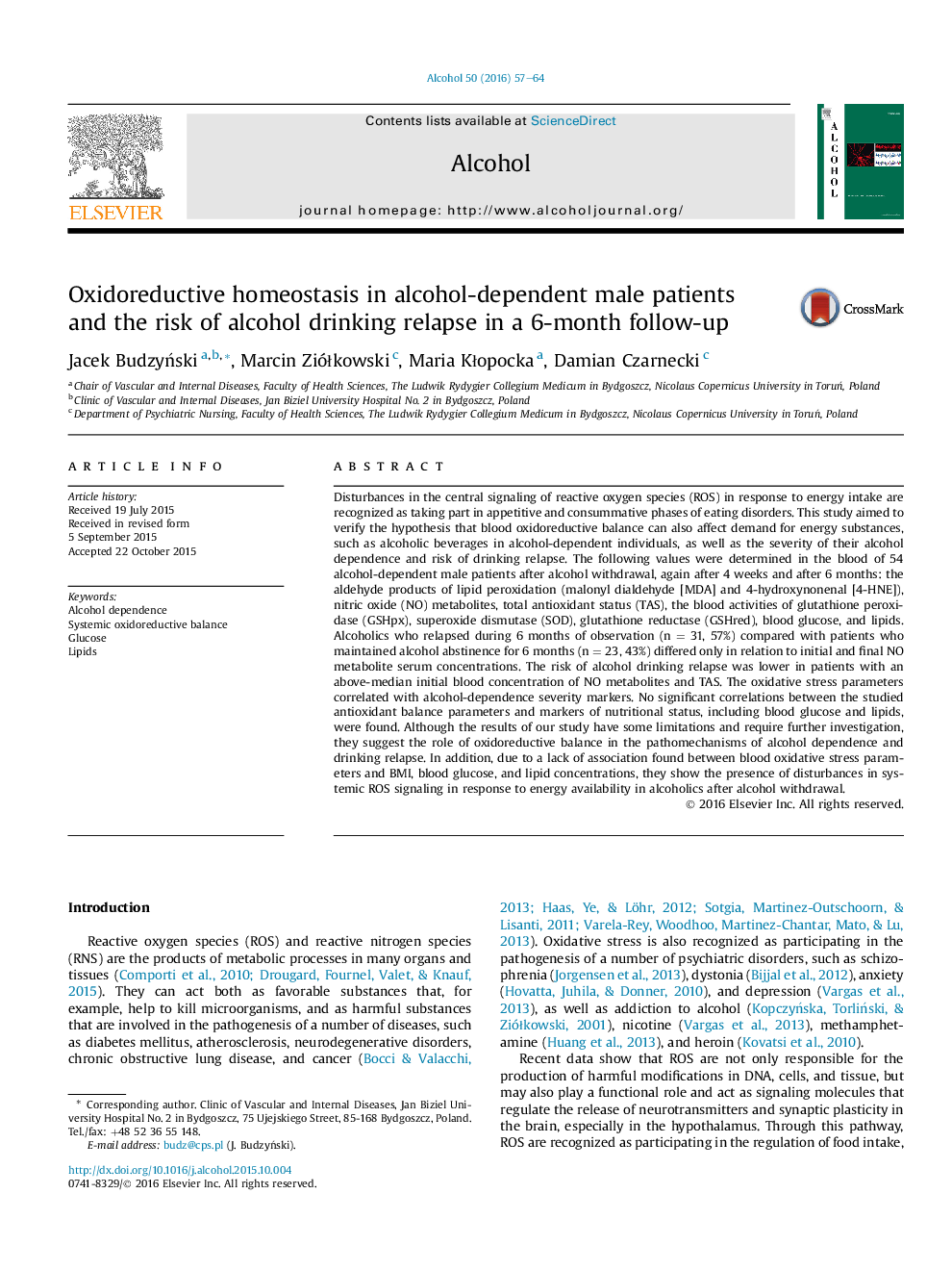| کد مقاله | کد نشریه | سال انتشار | مقاله انگلیسی | نسخه تمام متن |
|---|---|---|---|---|
| 7501643 | 1485979 | 2016 | 8 صفحه PDF | دانلود رایگان |
عنوان انگلیسی مقاله ISI
Oxidoreductive homeostasis in alcohol-dependent male patients and the risk of alcohol drinking relapse in a 6-month follow-up
ترجمه فارسی عنوان
هوموستاز اکسیدرودوکسیک در مبتلایان به الکل وابسته به التهاب و خطر ابتلا به الکل مصرف نوشیدن در یک پیگیری 6 ماهه
دانلود مقاله + سفارش ترجمه
دانلود مقاله ISI انگلیسی
رایگان برای ایرانیان
کلمات کلیدی
وابستگی الکلی، تعادل سیستمیک اکسید کننده گلوکز، لیپیدها،
موضوعات مرتبط
علوم زیستی و بیوفناوری
بیوشیمی، ژنتیک و زیست شناسی مولکولی
زیست شیمی
چکیده انگلیسی
Disturbances in the central signaling of reactive oxygen species (ROS) in response to energy intake are recognized as taking part in appetitive and consummative phases of eating disorders. This study aimed to verify the hypothesis that blood oxidoreductive balance can also affect demand for energy substances, such as alcoholic beverages in alcohol-dependent individuals, as well as the severity of their alcohol dependence and risk of drinking relapse. The following values were determined in the blood of 54 alcohol-dependent male patients after alcohol withdrawal, again after 4 weeks and after 6 months: the aldehyde products of lipid peroxidation (malonyl dialdehyde [MDA] and 4-hydroxynonenal [4-HNE]), nitric oxide (NO) metabolites, total antioxidant status (TAS), the blood activities of glutathione peroxidase (GSHpx), superoxide dismutase (SOD), glutathione reductase (GSHred), blood glucose, and lipids. Alcoholics who relapsed during 6 months of observation (n = 31, 57%) compared with patients who maintained alcohol abstinence for 6 months (n = 23, 43%) differed only in relation to initial and final NO metabolite serum concentrations. The risk of alcohol drinking relapse was lower in patients with an above-median initial blood concentration of NO metabolites and TAS. The oxidative stress parameters correlated with alcohol-dependence severity markers. No significant correlations between the studied antioxidant balance parameters and markers of nutritional status, including blood glucose and lipids, were found. Although the results of our study have some limitations and require further investigation, they suggest the role of oxidoreductive balance in the pathomechanisms of alcohol dependence and drinking relapse. In addition, due to a lack of association found between blood oxidative stress parameters and BMI, blood glucose, and lipid concentrations, they show the presence of disturbances in systemic ROS signaling in response to energy availability in alcoholics after alcohol withdrawal.
ناشر
Database: Elsevier - ScienceDirect (ساینس دایرکت)
Journal: Alcohol - Volume 50, February 2016, Pages 57-64
Journal: Alcohol - Volume 50, February 2016, Pages 57-64
نویسندگان
Jacek BudzyÅski, Marcin ZióÅkowski, Maria KÅopocka, Damian Czarnecki,
